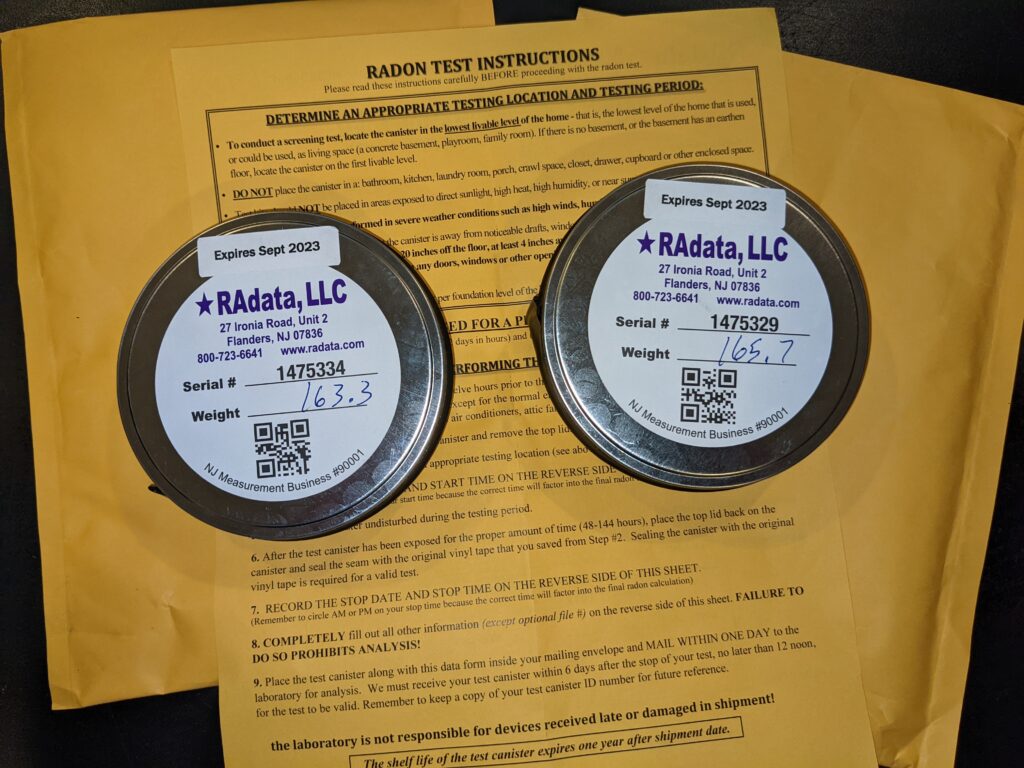An important part of a complete New Jersey home inspection should be testing for radon gas. The Environmental Protection Agency (EPA) recommends performing a radon gas measurement if you are buying or selling a home. New Jersey home inspectors should be licensed to perform NJ Radon Testing.
Radon is a radioactive gas that is found in homes all over the United States. Radon comes from the decomposition of uranium in the soil and enters the home through cracks and other openings such as basement floor slab cracks, and other openings such as floating slab gaps and sump pits. Any home can have a radon problem including newer homes and older homes. Here in NJ roughly 1 in 13 homes has a radon concentration over the EPA action level of 4 pCi per liter of air.
Radon levels cannot be predicted based on state, neighborhood or location. Radon levels will vary from home to home. Do not rely on radon measurements that were taken in surrounding homes. Homes that are next to each other will have differing radon levels. Testing is the only way to determine the actual radon levels in the home.
The EPA recommends correcting the home if radon gas concentrations are over 4 pCi per liter of air or higher. Radon concentrations less than 4 pCi per liter of air still present a health risk and consideration should be given to taking steps to lower them as well. Correcting radon under 4 pCi is not required but should be considered.
The EPA estimates that radon causes thousands of cancer related deaths each year in the United States. In fact, this number is roughly 21,000 cancer related deaths per year attributable to high radon gas concentrations.
Radon is a human carcinogen and a cancer-causing radioactive gas. When you breathe in air that contains high levels of radon you increase your risk in contracting lung cancer. Radon is actually the second leading cause of lung cancer in the United States today. This risk is especially high if a person smokes and there are high levels of radon gas in their home.
New Jersey home inspectors should test for radon gas when performing home inspections in New Jersey. Testing is the only way to determine what the radon levels are in a home. If radon concentrations are high there are ways to correct the issue.
The EPA recommends that you know what the radon levels are in a home that you are buying. The radon test should be placed in the lowest level where a person would occupy. This is considered the lowest living level
Most New Jersey home inspectors are going to use a passive radon testing devise. These passive devises consist of charcoal canisters, alpha track detectors, charcoal liquid scintillation devices, and electric ion chamber detectors. These types of tests are exposed to the air in the home for a specified period of time then are packaged up and sent to a certified laboratory for analysis.
Active radon testing devices require power to operate. These include continuous radon monitors and continuous working level monitors. These devises continually monitor and measure the radon decay products in the air. Many of these devises provide a report of this information. The reporting can reveal any unusual swings in the radon levels during the testing period. In addition, some of these devises are designed to deter or detect interference. The drawback is this type of testing is that it costs considerably more than short term radon testing.
While performing radon testing “closed house conditions” should be maintained. The term closed house conditions means that every window and every door must be kept closed except for normal entry and exit from the home. The operation of any fans or other appliances that bring in air from the exterior should not be operated. The central A/C may be operated while a radon test is being conducted in the home. Window units may also be used if they are well sealed, and they are operated on the recirculating setting so that fresh air is not bought into the home.
If high concentrations of radon are found during a real estate transaction the buyer and seller should discuss costs and the timing of radon remediation. The costs of installing a radon mitigation system is roughly $3000.
In most cases a sub slab depressurization system (depressurization: a negative pressure created in one area compared to an adjacent area) is installed to reduce radon level. These systems do not require major changes to the typical home. These systems prevent radon gas from entering the living space.
Important: Surgeon Generals Health Warning Regarding Radon Gas.
“Indoor radon gas is the second-leading cause of lung cancer in the United States and breathing it over prolonged periods can present a significant health risk to families all over the country. It’s important to know that this threat is completely preventable. Radon can be detected with a simple test and fixed through well-established venting techniques.”
It is clear that New Jersey home inspectors should educate their home buying clients about the dangers of long-term radon gas exposure and recommend radon testing as a part of the due diligence process. If high levels of radon gas exist in the house home inspectors in NJ should explain that the issue is very correctable using a simple depressurization fan system.

